
For Hollywood, 2017 has been two big steps forward, one calamitous tumble backwards onto its butt. The first three months of the year featured an unprecedented run of hit movies (Beauty and the Beast, Hidden Figures, and Get Out, to name a few), culminating in the best first quarter at the domestic box office in at least 35 years. By the end of March, it seemed like maybe, just maybe, the film industry had finally figured out how to make successful movies for a diverse array of audiences.

Or maybe not.
Since April, Hollywood has spent a breathtaking amount of time and money on a slate of dilapidated franchises and highly dubious attempts to create new ones. The result has been one of the industry's worst second quarters ever, with the lowest ticket sales since 1986. 1986! Thirty-one years ago! In fact, were it not for a plucky crew of intergalactic ne'er-do-wells and a certain Amazonian princess, the first two months of the summer would be starved for any blockbuster hits at all.
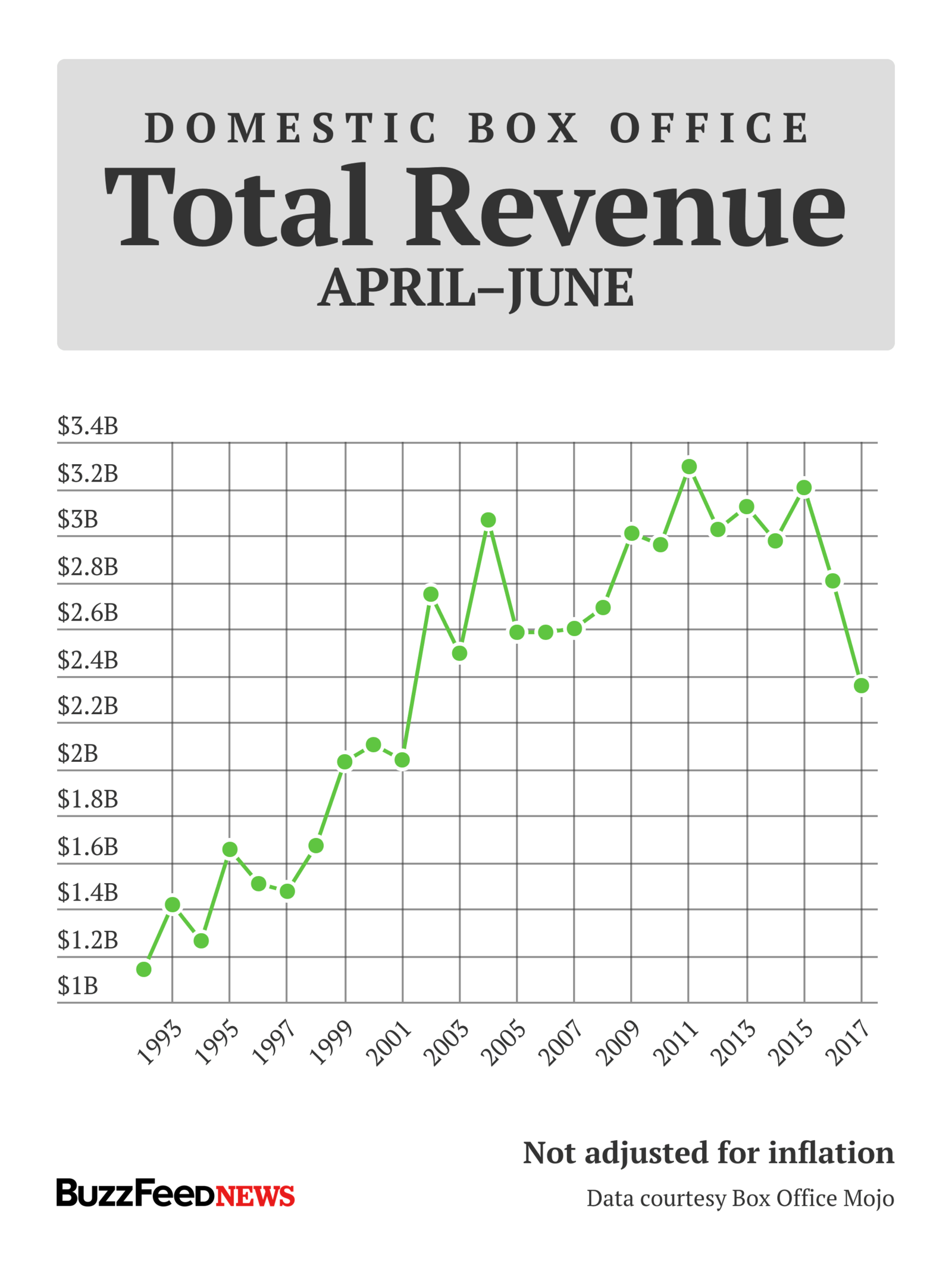
This general see-saw between smart risk-taking and fear-driven risk aversion has left domestic ticket sales down 1.7% from last year, with overall domestic box office revenue up a meager 0.5%.
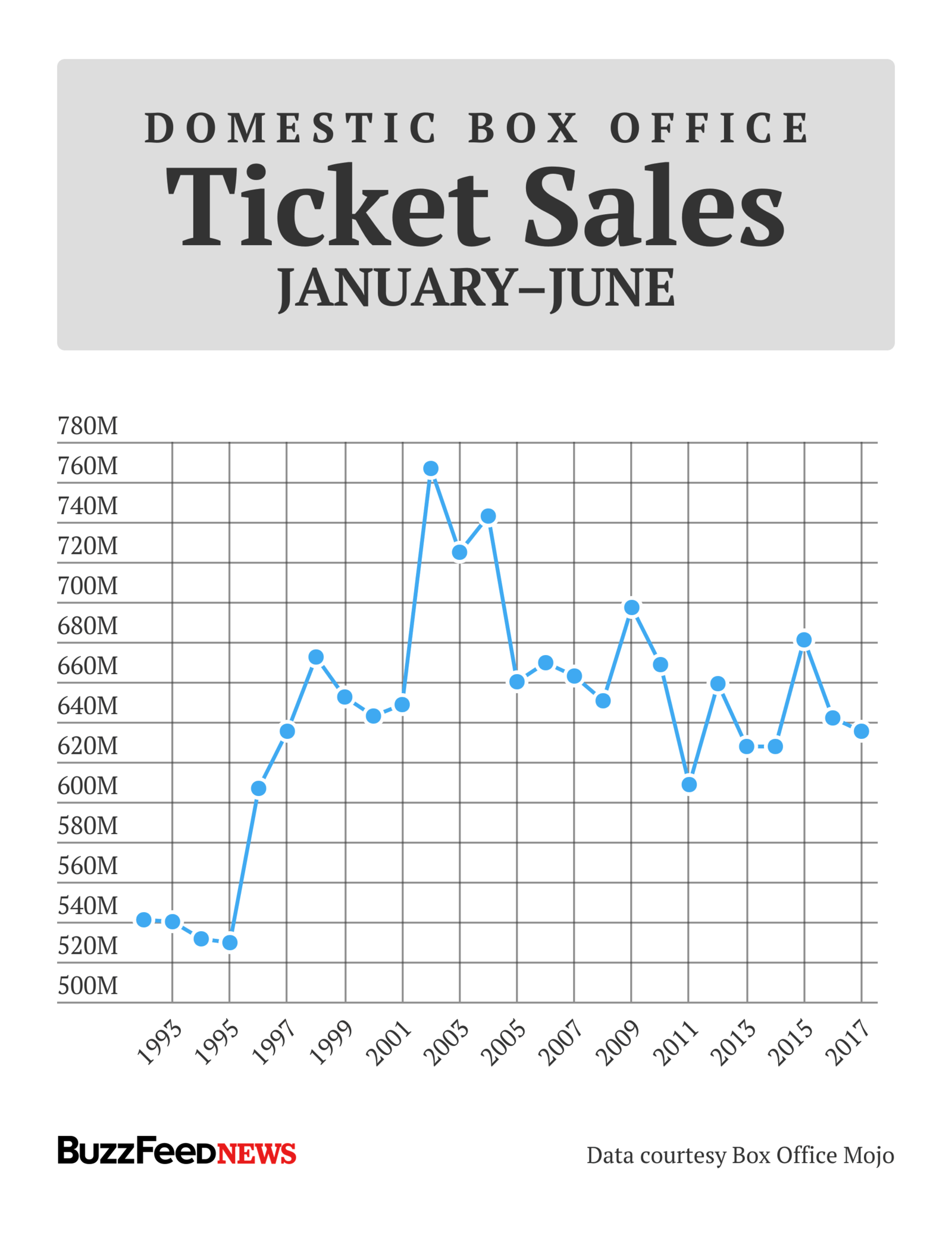
Studio filmmaking moves so slowly that it will be at least late 2018 before we know whether Hollywood has heeded the lucrative lessons of 2017's early months. So in the hope that somebody's paying attention, below are the highlights from the year through the end of June, and the calamities Hollywood should hope to avoid in the future.
WINNERS: Patty Jenkins and Gal Gadot
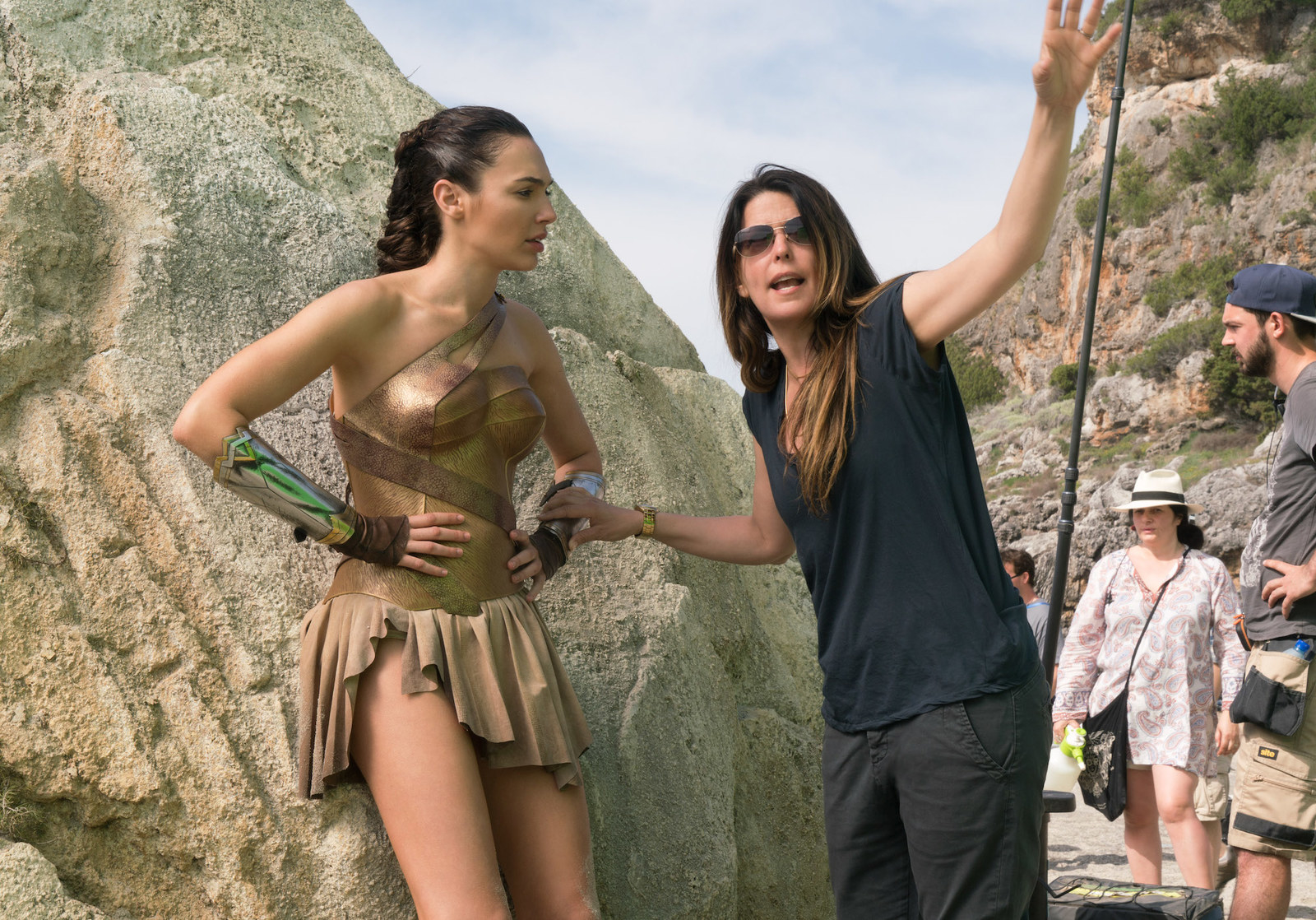
Imagine for a second a world in which Wonder Woman had flopped. Imagine that its story had been as needlessly grim as its DC forebears were and that its title superhero had been portrayed in some exceedingly unpleasant way. Now imagine how much harder it would be for female filmmakers to convince studios to hire them to make expensive studio tentpole movies. Imagine how many female-forward action movies would be sidelined instead of greenlit. Imagine all the terrible hot takes about blah blah blah the death of third-wave feminism blah blah blah Trump-era superheroes. And imagine all the millions of Wonder Woman fans heartbroken after seeing a movie that failed them.
Now rejoice, because we don't live in that world!
Instead, we get to live in a world in which director Patty Jenkins delivered a Wonder Woman movie filled with heart, humor, and romance, in which Gal Gadot embodied her role with soul-stirring goodness and strength, and in which audiences wholeheartedly embraced the film en route to $700 million worldwide and counting. Wonder Woman has single-handedly repaired the reputation of Warner Bros.' shaky DC cinematic universe, and exploded the lie that audiences aren't interested in action movies starring and/or directed by women. It is easily the movie of the summer, and if studio executives still enjoy making lots of money, the ripple effects of Wonder Woman's success should hopefully be felt for years to come.
What's next? Jenkins is developing the Wonder Woman sequel with an eye to directing it; Gadot will next appear as Wonder Woman in Justice League, scheduled to open Nov. 17.
WINNER: Disney
In 2016, Disney redefined box office success with three movies in the first half of the year that earned over $1 billion worldwide. So when pointing out that this year, Disney has opened just one $1 billion movie (Beauty and the Beast), please understand that the studio is now competing with its own astronomic expectations. Two of Disney's high-profile sequels — the fifth Pirates of the Caribbean movie, and Cars 3 — have also underperformed in comparison to their predecessors.
But thanks largely to Beauty and the Beast and Guardians of the Galaxy Vol. 2, Disney has still earned over $3.6 billion worldwide, leading the rest of the top studios by a comfortable margin. And even though this looks to be a rather fallow year for the studio — it won't open another film until November — there is a very good chance it will still end up on top of the box office for the third year in a row.
What's next? Marvel Studios' Thor: Ragnarok on Nov. 3, Pixar's Coco on Nov. 22, and Lucasfilm's Star Wars: The Last Jedi on Dec. 15. Speaking of…
LOSER: Lucasfilm
When Star Wars: The Last Jedi opens this December, Lucasfilm will almost certainly three-peat for the highest-grossing movie of the year domestically, after The Force Awakens in 2015 and Rogue One in 2016. That is as close to the definition of winning as you can get in Hollywood, but that level of unparalleled success also brings an equally unparalleled level of unforgiving pressure — and scrutiny.
Exhibit A: Lucasfilm CEO Kathleen Kennedy's decision to fire directors Phil Lord and Christopher Miller from the untitled Han Solo prequel movie when they only had weeks left to shoot in principle photography. The dispute reportedly came down to intractable issues over creative control, and the immediate blowback cast as much of a cloud over Kennedy's judgment as it did over Lord and Miller's abilities as filmmakers, not to mention the ultimate quality of the film (which is now under the direction of Hollywood veteran Ron Howard). This story is not going away anytime soon, particularly as the Directors Guild sorts out the messy question of directorial credit and the film's in-demand actors deal with inevitable questions over what went wrong.
Exhibit B: Colin Trevorrow. The Jurassic World director's latest film, The Book of Henry, is a small-scaled family drama that opened on June 16 in just 579 theaters — and to some of the most scathing reviews of the year. That would be embarrassing enough for any filmmaker, but several of those critics also went out of their way to call into question whether or not Trevorrow is qualified to direct 2019's Star Wars: Episode IX, as was announced in 2015. Were it any other franchise, this kind of open hostility would feel wildly out of line, but Episode IX is a movie that stands to make upwards of $2 billion. And after two years of dominating the box office and pop culture, Lucasfilm is now learning about the, er, dark side of astronomic success.
What's next? The Last Jedi on Dec. 15, followed (purportedly) by the untitled Han Solo movie on May 25, 2018.
WINNER: Universal Pictures
Two of 2017’s most painful flops — The Great Wall with Matt Damon, and The Mummy with Tom Cruise — came from Universal’s slate this year. But the good greatly outweighed the bad. The Fate of the Furious did cool a bit at the domestic box office in comparison to Furious 7, but it still earned over $1 billion internationally, with the biggest global opening weekend of all time. Similarly, Fifty Shades Darker wasn't nearly the phenomenon of its predecessor, but it still took in a steamy $378.8 million worldwide. And Get Out and Split each scared up over $250 million globally on budgets that weren't even a tenth of that amount.
Overall, 2017 so far has been quite good to Universal — save for its record-setting run in 2015, it’s been the studio’s best year ever.
What's next? Universal's second half of the year showcases the rare studio slate that's heavier on non-franchise fare, like the comedy Girls Trip with Jada Pinkett Smith and Queen Latifah on July 21, the fact-based dramedy American Made with Cruise on Sept. 29, the Groundhog Day-but-a-horror-movie Happy Death Day on Oct. 13, the serial killer thriller The Snowman with Michael Fassbender on Oct. 20, and the military veteran drama Thank You for Your Service with Miles Teller on Oct. 27. And then on Dec. 22, the Barden Bellas reunite for Pitch Perfect 3.
LOSERS: Sequels and franchises no one wanted (again)
As if haunted by the ghosts of last summer's wasteland of antique sequels and dubious franchise "debuts," several sequels this year — like the sixth Alien movie, the fifth Transformers movie, and Cars 3 — have earned by far the worst domestic grosses in their respective franchise's histories when adjusting for ticket price inflation. Meanwhile, expensive wannabes Power Rangers, Ghost in the Shell, and King Arthur: Legend of the Sword failed in spectacular fashion to do the only thing they were made to do: open the door for lucrative sequels. The Mummy's flop at the domestic box office was at least mitigated by its decent international returns. But Universal meant to use that film to launch its already questionable Dark Universe of interconnected monster movies starring actors (Cruise, Johnny Depp, Russell Crowe) who were a really big deal in the early 2000s. Given its embarrassing reviews and lackluster performance, the studio is perhaps wishing it had instead kept that title under wraps. (I'm sorry.)
Consider that studios spent roughly $1 billion — that’s $1,000,000,000 — on just these seven movies, according to their reported respective budgets. Think about all the movies that didn’t get made because that money was being spent on these projects instead, projects that weren’t particularly in demand in the first place, and didn’t particularly make their studios any money — and, in many cases, actually cost them dearly.
What's next? Thankfully, the rest of the summer promises sequels — Spider-Man: Homecoming and War for the Planet of the Apes — that audiences seem genuinely keen on. There are, however, several questionable franchise premieres on the horizon: Valerian and the City of a Thousand Planets on July 21, The Emoji Movie on July 28, and The Dark Tower on Aug. 4.
WINNER: John Wick: Chapter 2
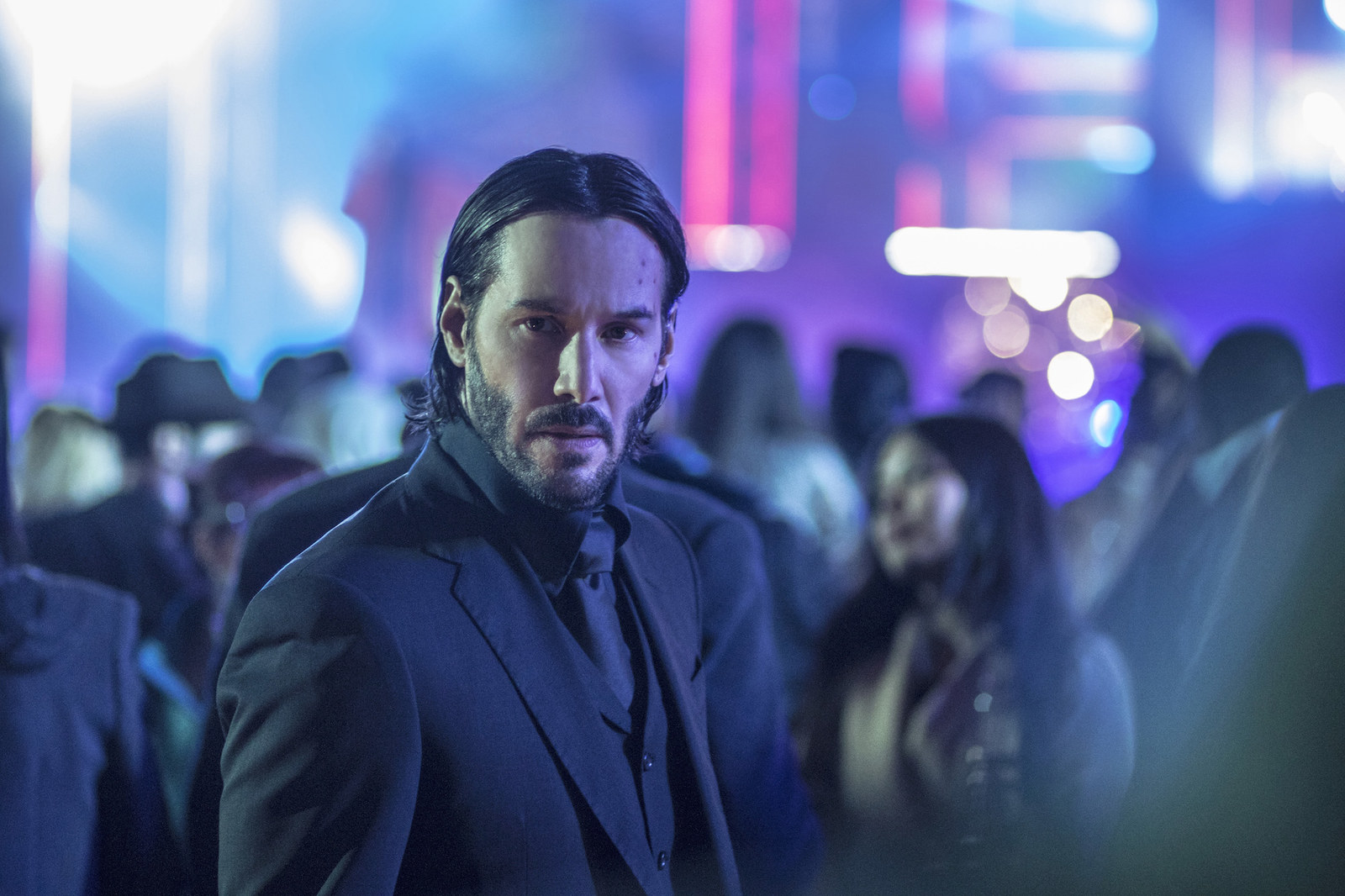
Speaking of sequels, no franchise follow-up has been more successful in 2017 than John Wick: Chapter 2: The stunt-focused action thriller is the only franchise movie this year that has nearly doubled the global take of its predecessor, earning $166.8 million against the $88 million global take of 2014’s John Wick. This is how franchises are supposed to work, satiating an undeniable audience demand, instead of trying to manufacture it.
What's next? Director Chad Stahelski told The Independent in June that he’s “knee deep” in developing Chapter 3.
WINNER: Jordan Peele

In hindsight, Jordan Peele's feature directing debut, produced by micro-budget super-producer Jason Blum, seems like such an self-evidently great idea: Use the tropes of thrillers and horror movies to make a smart film about race that wouldn’t feel like a lecture. And yet, watching Get Out for the first time, especially in a packed theater, felt like a revelation — or maybe just a long overdue reminder that studio movies can still speak directly to the real world as it is today both on a grand scale and in a delightfully entertaining way. Audiences flocked to it: Get Out made $175.5 million in the US and Canada, more than the far more expensive — and far less entertaining — Kong: Skull Island, Pirates 5, and Transformers 5.
As a result, Peele rocketed from a popular Comedy Central star to one of the most in-demand filmmakers in Hollywood. But he’s decided not to chase the career path of so many filmmakers with sudden success at their fingertips, declining offers to direct expensive studio tentpole movies and instead reinvesting in his genre of self-described "social thrillers." If only more filmmakers would follow his example — and had his daring.
What's next? Another social thriller for 2019.
WINNER: M. Night Shyamalan
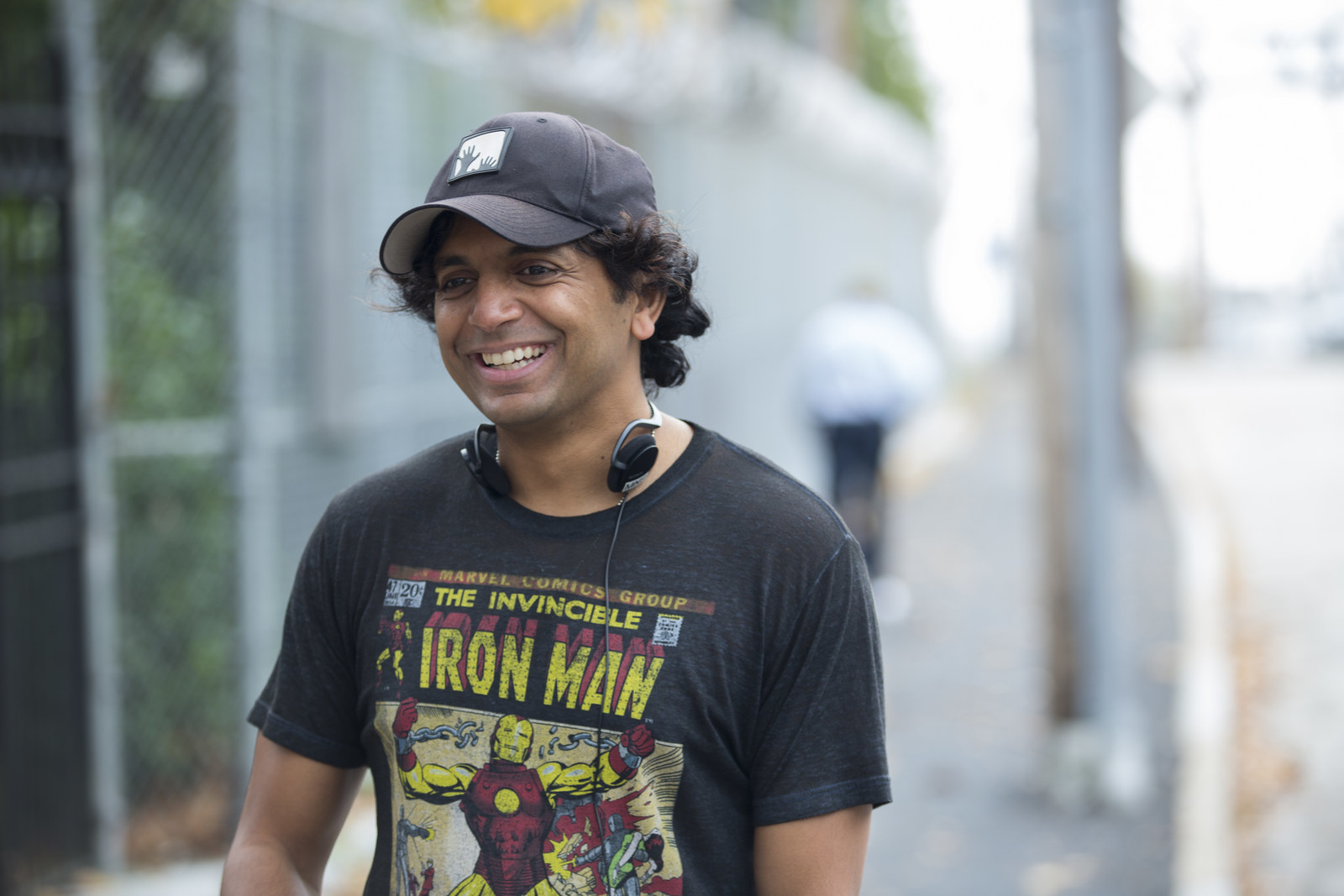
Four years ago, M. Night Shyamalan's career was a sad shadow of its former glory. Between the infamously bad acting in 2006’s The Happening, the controversial whitewashing in 2010’s The Last Airbender, and whatever was happening between Will and Jaden Smith in 2013’s After Earth, the filmmaker had slipped from "The Next Spielberg" into something of a Hollywood joke. But then he met Blum, and learned the power of a tiny budget — or, to put another way, the power of restraint.
Their first film together, 2015's The Visit, took in $98.5 million on a reported $5 million budget. But January's thriller Split truly resurrected Shyamalan's career as a blockbuster filmmaker — in more ways than one, really. The movie took in $276.9 million worldwide, and reminded audiences of his genuine talents as a filmmaker and storyteller. To say more would be to spoil the very Shyamalanian twist at the end of the film, but suffice it to say for the first time in more than a decade, people are genuinely excited to see his next movie.
What's next? A sequel to Split.
LOSERS: Live-action comedies
You would think that at a time when the news is a nonstop shitshow, audiences would be desperate for a chance to laugh. And yet there hasn't been a single runaway hit studio comedy so far in 2017. Baywatch comes closest, grossing $152.2 million worldwide, but the action-heavy production cost a reported $69 million, undercutting any possible profits (especially factoring in the money Paramount burned in its full-court press marketing push).
From there, things get real dire, real fast: Snatched with Amy Schumer and Goldie Hawn earned just $58.5 million globally; Fist Fight with Ice Cube and Charlie Day earned $41 million; Rough Night with Scarlett Johansson, Jillian Bell, Zoë Kravitz, Ilana Glazer, and Kate McKinnon earned $30.5 million; and CHiPs with Dax Shepard and Michael Peña earned $25.5 million. That's less than The Mummy earned in its global opening weekend combined. The Mummy!
The one bright spot: The heist comedy Going in Style — with Morgan Freeman, Michael Caine, and Alan Arkin — earned $82 million worldwide on a budget of just under $25 million, with more than 70% of its audience reportedly over 50.
What's next? Relief may be soon on the horizon: Advance buzz on Girls Trip is approaching Bridesmaids-level enthusiasm. The NASCAR comedy Logan Lucky, with Channing Tatum, Adam Driver, and Daniel Craig, and the action comedy The Hitman's Bodyguard, with Ryan Reynolds and Samuel L. Jackson, both follow on Aug. 18.
WINNERS: How to Be a Latin Lover and Bāhubali 2: The Conclusion
Both of these films flew past expectations as yet two more reminders that there are large, terribly underserved audiences that will show up en masse to the right movies.
How to Be a Latin Lover opened with $12.3 million domestically in just 1,118 theaters, en route to over $58 million worldwide. Despite the presence of American stars like Rob Lowe and Kristen Bell, the film's marketing emphasized Mexican actor Eugenio Derbez (Instructions Not Included) as a washed-up playboy who moves in with his sister (Salma Hayek). Close to 90% of its audience was Latinx, a triumph for the nascent film company Pantelion Films, a partnership between Lionsgate and Televisa.
Bāhubali 2: The Conclusion was even more of a box office revelation, taking in $10.4 million in just 425 theaters (for an impressive $24,500 per theater average). Ultimately earning $20.4 million domestically, the fantasy epic now stands as the top-grossing Indian movie ever in the US and Canada, making for quite an auspicious inaugural release for its US distributor, Great India Films.
What's next? Pantelion and Great India Films have not yet announced their next domestic releases.
LOSER: Paramount Pictures
Paramount has barely operated as a full-fledged studio for a few years now — reportedly due to shenanigans at its parent company, Viacom — but even by its lowered standards, 2017 has been a really crap year. Paramount's crown-jewel franchise, Transformers, is showing major audience fatigue just as the studio hopes to expand it with a spinoff movie about Bumblebee. Ghost in the Shell couldn't shake the whitewashing controversy that tormented it from the moment Scarlett Johansson agreed to play the lead role. And the family movie Monster Trucks — literally about monsters that can live inside trucks — was such a debacle that it reportedly forced Viacom to take a $115 million write-down.
But hey! At least Paramount isn't the next studio on this list!
What's next? Let it not be said that Paramount is afraid of taking risks. On Oct. 13, Jennifer Lawrence and Michelle Pfeiffer will headline director Darren Aronofsky's mysterious thriller Mother! On Oct. 27, Gugu Mbatha-Raw, Elizabeth Debicki, and David Oyelowo will star in another entry in producer J.J. Abrams' loosely connected Cloverfield trilogy (it was previously known as God Particle, and is currently without a title). On Nov. 3, Matt Damon and Julianne Moore will star in George Clooney's next directorial effort, Suburbicon, a dark comedy written by Joel and Ethan Coen. On Nov. 10, Mel Gibson and John Lithgow will join Mark Wahlberg and Will Ferrell in the sure-why-not sequel Daddy's Home 2. And on Dec. 22, Damon and Kristen Wiig will star in director Alexander Payne's Downsizing, literally a movie about a guy who decides to shrink himself.
WINNER: Everything, Everything

Ever since The Fault in our Stars made over $300 million worldwide in 2014, Hollywood has been chasing after another inexpensive teenage drama that can make blockbuster money. For a while, it looked like this may be the year studios finally gave up that chase: February’s Earth-to-Mars romance The Space Between Us with Asa Butterfield and Britt Robertson barely took off at all, earning just $14.8 million worldwide, and in March the Groundhog Day-but-a-YA-drama Before I Fall did no better, earning roughly $14.4 million worldwide.
But then the winsome romance Everything, Everything, based on the YA novel by Nicola Yoon, debuted in May, and turned a tidy profit, taking in $45.9 million globally from a reported $10 million budget. That’s nowhere near how well The Fault in our Stars performed at the box office, certainly, but few dramas ever hope to make that much money these days — and it’s clearly a better return on investment than several movies this year that cost 10 times that amount. More to the point, Everything, Everything also happens to be the rare studio movie in which the director, Stella Meghie, and star, Amandla Stenberg, are women of color — more of this, please!
What's next? Stenberg will next star in the World War II drama Where Hands Touch from writer-director Amma Asante (Belle, A United Kingdom). Meghie hasn’t yet announced her next project.
LOSER: Sony Pictures
Let us take a moment of silence for the sad fate of Sony Pictures. Nothing — nothing at all — has worked for the studio this year: not the all-animated reboot of the Smurfs franchise, not the sci-fi thriller Life, and not the distaff bachelorette-party-gone-wrong comedy Rough Night. Collectively, Sony's movies in 2017 have made less domestically than Beauty and the Beast made in its first five days.
The only possible silver lining: Resident Evil: The Final Chapter. Sure, it bombed hard in the US and Canada, with just $26.8 million, but it made over 10 times that amount internationally, largely thanks to its inexplicably terrific run in China. Thanks, China!
What's next? Spider-Man: Homecoming, opening July 7, should finally brighten Sony's box office fortunes, even if the studio had to bring in Disney-owned Marvel Studios to reboot the franchise for the second time in five years. From there, well, The Emoji Movie on July 28 and The Dark Tower on Aug. 4 probably couldn't make Sony’s year any worse, right? Then there's the faith-based drama All Saints with John Corbett on Aug. 25, the remake of the horror thriller Flatliners with Ellen Page on Sept. 29, the fact-based firefighting drama Granite Mountain Hotshots with Miles Teller and Jeff Bridges on Oct. 20, and the unnecessarily subtitled Jumanji: Welcome to the Jungle, with Dwayne Johnson and Kevin Hart on Dec. 20. Good luck, Sony!
WINNER: Hugh Jackman
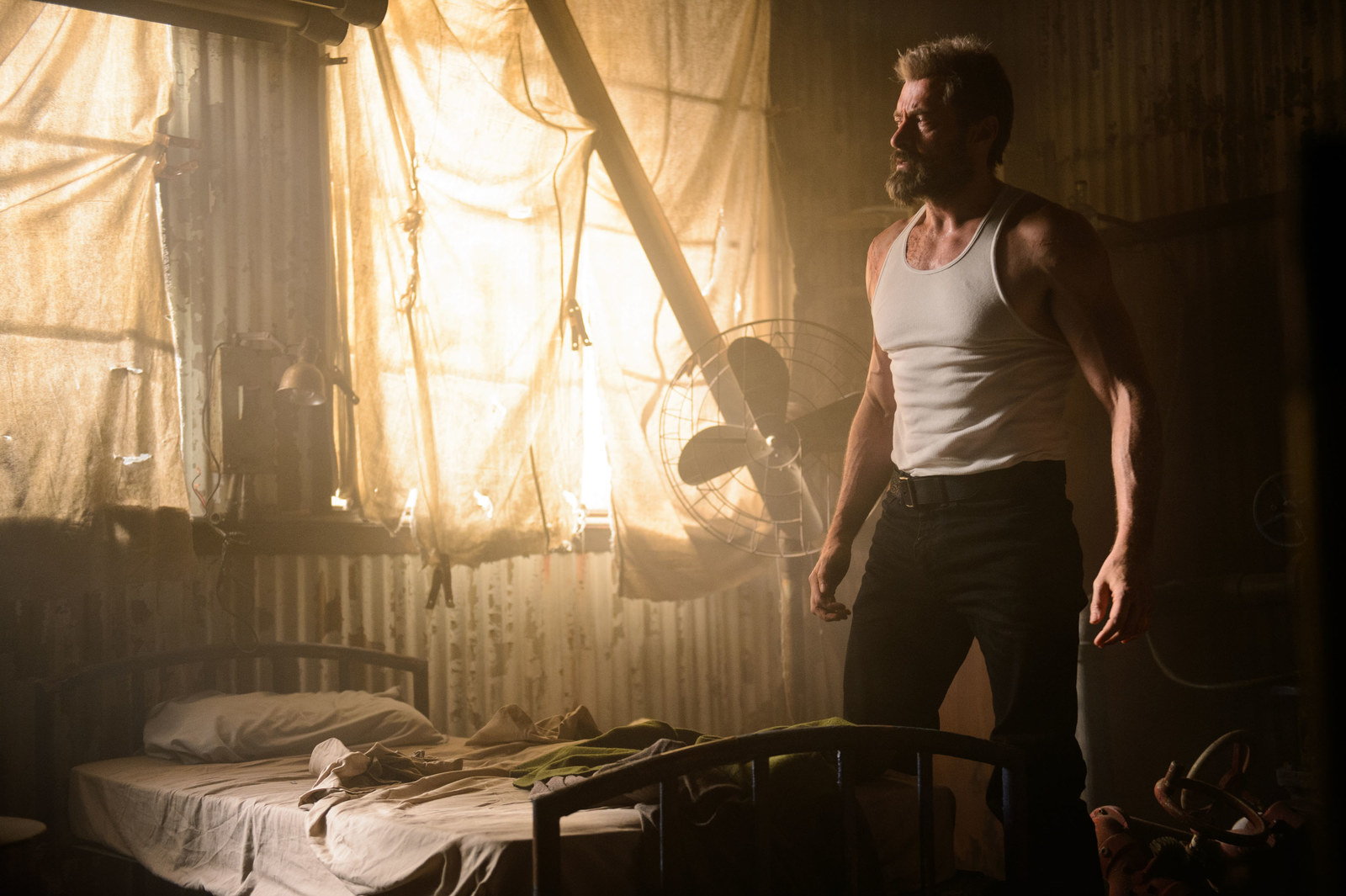
Despite his obvious charm and classic beauty, Hugh Jackman has been basically a single-franchise movie star. His only major live-action hits (other than Les Miserables) have been when he's taken up Wolverine's claws. But those movies have been more than enough to feed his career: Including cameos in X-Men: First Class and X-Men: Apocalypse, Jackman has played the role nine times in 17 years.
Which makes his decision to leave his marquee character behind for good after Logan that much more striking, and the surprising grace and emotional power of the movie that much more affecting. Logan’s R rating allowed director James Mangold to make great use of Jackman's physical commitment to the role — those claws can finally draw real blood. But it's the actor's alternately funny and touching scenes with Patrick Stewart (as the dementia-prone Charles Xavier) and Dafne Keen (as the fearsome kid mutant X-23) that underline how much of a classic leading man Jackman can be when given the chance. Logan, ironically, was the first time Jackman was allowed to play Wolverine as a fully realized person, not a fantastically shredded comic book hero. Here’s hoping he can now find a few non-mutant roles that also let him showcase those talents.
What's next? Jackman will play circus pioneer P.T. Barnum in the original musical The Greatest Showman, on Dec. 25.
LOSER: Netflix
To be clear, we're talking about Netflix movies here. In May, the biggest streaming service on the planet was humiliated at the Cannes Film Festival after officials effectively banned it from future lineups due to Netflix's conviction not to exhibit its original films in theaters before they premiere on streaming. Festival jury president Pedro Almodóvar even stated he couldn't imagine awarding any movies that wouldn't be shown in theaters, and, indeed, both of Netflix's well-received films at Cannes — Okja with Tilda Swinton and Jake Gyllenhaal, and The Meyerowitz Stories (New and Selected) with Ben Stiller and Adam Sandler — came home empty-handed.
The whole kerfuffle focused a harsh spotlight on Netflix's inability to disrupt the movie business with anything close to the monumental impact it's had on television.
The one part of the film industry Netflix has transformed — the indie market, where the streaming service has been gobbling up movies at an unnerving rate — has not been for the better: Several standout indie films (like Sundance winner I Don't Feel at Home in This World Anymore, and Toronto Film Festival standout Barry) have premiered on Netflix with nary a ripple in the pop culture landscape.
At least, that's how it seems. Because Netflix won't disclose its audience data, we have no way of knowing how any of its feature films are performing. Without that crucial context, it's even difficult to sort out just how impressed we should be by CEO Reed Hastings' April announcement that Netflix subscribers have watched 500 million hours of Sandler's movies since the release of The Ridiculous 6 in Dec. 2015. That number certainly sounds enormous, but as a point of comparison, we don’t know how many hours Netflix subscribers have spent watching its hits like Stranger Things or Orange Is the New Black. We don’t even know how Netflix is defining an “Adam Sandler movie” (does he have to star, or could he also produce?), or “watching” (does it have to be the entire film, or just a part of it?), or an “hour” (does it have to be a full one, or does it have to just round up?).
Okja, which started streaming on June 28, certainly feels like it could be a watershed movie for Netflix, but we can never know for certain — and that is a sad disservice to the film, and the filmmakers. It’s the one time lovers of cinema would just as soon not be left in the dark.
What's next? The anorexia drama To the Bone with Lily Collins on July 14, the romantic comedy Naked with Marlon Wayans on Aug. 11, and the horror thriller Death Note on Aug. 25. (The Meyerowitz Stories does not yet have an official release date.)
DRAW: Emma Watson
On the one hand, Beauty and the Beast's $1.26 billion in global box office returns means Watson is now the highest-grossing female actor in the world, with $9.68 billion in total grosses since her career began with Harry Potter and the Sorcerer's Stone in 2001. She is by far the most successful of her Potter compatriots, and she has the pick of just about any project she could possibly want.
On the other hand, Watson's film after Beauty and the Beast, the social media thriller The Circle with Tom Hanks, bombed hard: It opened in March in fifth place (behind the aforementioned debuts of How to Be a Latin Lover and Bāhubali 2, in fact) with just $9 million. It ultimately earned just $20.5 million domestically (and barely got a release internationally), not to mention the worst reviews of Watson's career. In just one month, Watson managed to demonstrate the awesome power and the bitter limitations of movie stardom in 2017.
What's next? Watson has not yet announced her next project.
